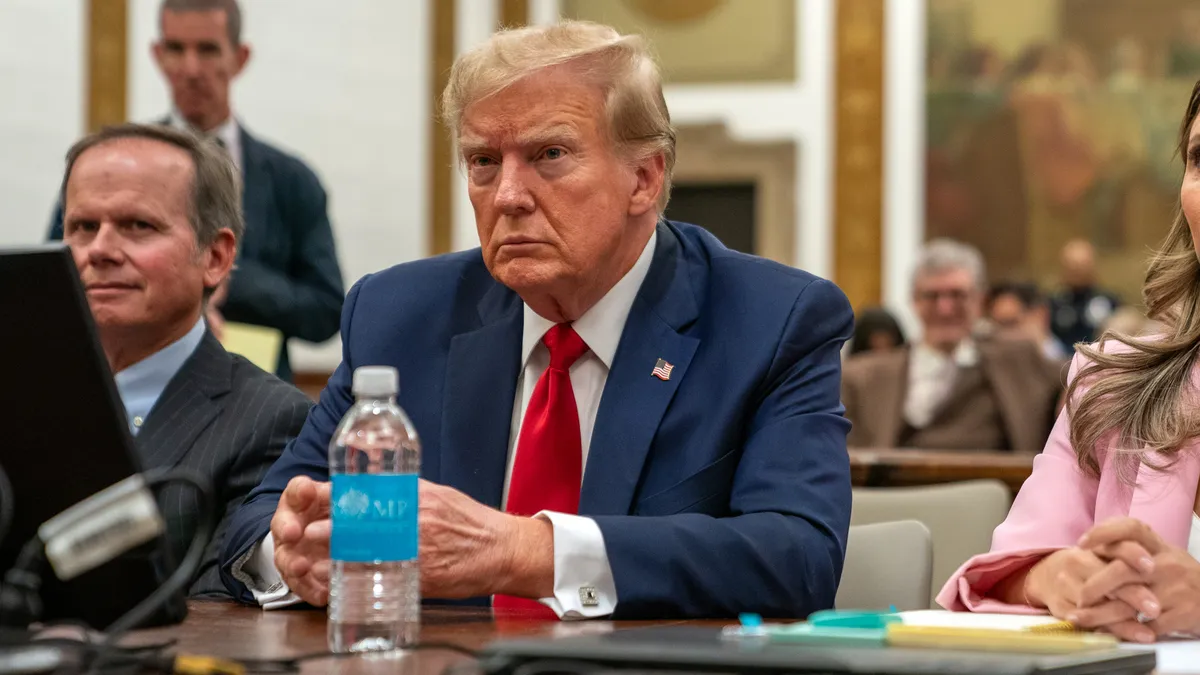Dive Brief:
- The New York Attorney General’s $250 million civil fraud complaint against former President Donald Trump has no merit from an accounting perspective, Eli Bartov, a professor of accounting at New York University’s Stern school of business, said Thursday during testimony for the defense.
- Bartov found “no evidence whatsoever” of accounting fraud in the Trump Organization’s financial statements, he told the court Thursday, with the former president in attendance. Per his analysis, the company’s statements of financial condition were not “materially misstated,” he said.
- “Your expert opinion is that from an accounting perspective, the AG’s claims have no merit?” Presiding Judge Arthur Engoron asked the witness to clarify. “That is absolutely my opinion,” Bartov said.
Dive Insight:
Financial reporting standards, and particularly generally accepted accounting principles have been silent, but critical players in the NY AG’s civil fraud case against the former president, which alleges that Trump and key officials in the Trump Organization — including his two eldest sons and the company’s ex-CFO Allen Weisselberg — fraudulently inflated Trump’s net worth in order to obtain bank loans with more favorable terms than would have otherwise been available.
Judge Engoron ruled in September prior to the beginning of the bench trial that the NY AG had established Trump and other defendants were liable for fraud, with NY AG Letitia James seeking a $250 million ruling against the former President. The trial will determine what if any penalties will be paid and whether Trump will be barred from doing business in New York.
Bartov took the stand Thursday as one of the last witnesses in the civil fraud case, with the former president slated to be called as the defense’s final witness Monday. In reference to the compaint he asserted that “there is not a single reference” to a particular provision of GAAP that was violated, Bartov testified Thursday, a claim that appears to be directly contradicted by the AG’s original complaint.
The suit, filed in September 2022, asserts that Trump and the Trump Organization “have no excuse for issuing Statements of Financial Condition that repeatedly violated GAAP rules in multiple ways despite expressly representing in the Statements that they were prepared in accordance with GAAP,” and goes on to allege a number of specific GAAP rule violations made by the defendents, including:
“(ii) failing to determine the present value of projected future income when including the income as part of an asset valuation; (iii) failing to disclose a substantial change in methodology from the prior year’s statement for how an asset value was derived; (iv) failing to value the entirety of Mr. Trump’s interest in a partnership, including all limitations and restrictions on his interest; and (v) including intangibles such as internally-generated brand premiums when calculating an asset’s value.”
Attorneys for Trump have repeatedly argued that the valuations included in the financial statements are subjective and should not be solely relied upon, an argument Bartov attempted to bolster with his Thursday testimony.
“The Federal Reserve advises banks not to rely on statements of financial condition because…they are likely to contain many, many errors,” Bartov said.
Errors do not constitute the appearance of fraud, Bartov said on the stand in response to questions from Trump attorney Jesus Suarez. “People who don’t know accounting can say, oh this is a terrible sin, this is evidence of fraud,” Bartov said.” Errors like this are not unusual. Errors in accounting are inevitable.”
This is partially because valuations of assets are inherently subjective, he said; while GAAP provides a set of standards for the preparer of a statement of financial condition to rely upon, GAAP is not restrictive, Bartov said. The preparer can “pick the rule out of the menu that they believe will be most informative” in preparing the statement, he said.
For example, GAAP standards contain two separate definitions of fair value — one that refers to the hypothetical value of an asset, and one that refers to the value of an asset if sold between market participants, Bartov testified; in essence, the difference between what something “could” or “would” be valued.
Jack Castonguay, an assistant professor of accounting at New York’s Hofstra University, respectfully disagrees with this framing of GAAP, he said in an emailed response to questions from CFO Dive Thursday.
“While it is true that valuations can vary and are inherently subjective, accountants are also supposed to assess the reasonableness of said estimates,” he said. Accountants are also directed to bring inaccurate or incomplete information to management and in the event they are not provided with corrected information, to disclose material misstatements in the financial statements, he said, pointing to authoritive guidance by the AICPA.
“For instance, I believe the judge in the case noted that the Trump Organization’s valuation for Mar-a-Lago were overstated by 2,300%,” Castonguay said. “That should have raised a flag with the accountant that the estimates provided were inaccurate. Estimates will certainly vary, but they should not vary by that order of magnitude.”
Attorneys for the NY AG objected to parts of Bartov’s testimony, protesting at one point that his answers veered into lecture territory and at a later point that the defense had hired someone to say whatever they wanted.
“You should be ashamed of yourself, talking to me like that,” Bartov responded angrily, adding that the AG’s office was the party which had made up allegations.
Trump attended the trial Thursday as a spectator alongside his son Eric Trump, also a named defendant in the case, who canceled testimony previously scheduled for Wednesday. Trump championed Bartov’s expertise on his way into the courtroom, following posts on social media site Truth Social lambasting presiding Judge Engoron for conducting a political “witch hunt” against him.














